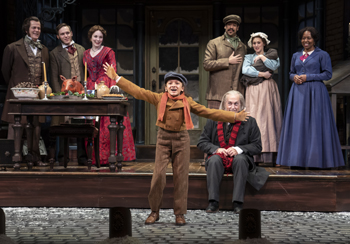
The Goodman Theatre's El Cantico de Navidad (literally, "The Song of Christmas") was not conceived in a vacuum. Chicago's long history of welcoming foreign-born residents is evidenced in its abundance of public buildings, neighborhood shops, and street signs whose exterior displays reflect the cosmopolitan ethnicity of their locales.
"The Goodman has always been committed to accessibility and inclusion, with A Christmas Carol representing its flagship effort at diversity," declares Goodman Artistic Associate Henry Godinez, citing the theater's groundbreaking 1984 selection of an African-American child to play Tiny Tim, and of the several traditionally-male characters depicted by female actors over the years (a trend leading to the 2018 transformation of Scrooge's nephew into a niece). Godinez, himself, brought innovation to the venerable classic in 1999 by casting deaf actor Rob Schleifer in the role of Ghost of Christmas Past.
There are several ways to render polyglot spoken-word oratory in real time—all of them complicated and/or expensive. Playgoers at the Goodman's Spanish-language performance of Christmas Carol should not arrive expecting to hear actors declaiming "Marley estaba muerto, para empezar" nor does the production's budget permit recorded speech to be broadcast through wireless headsets. Instead, a written text will be projected onto a video screen.
Arriving at Spanish colloquialisms equivalent to British idioms is not always easy, however. That task fell to Claudia Quesada, who discovered that the earliest translation into Spanish of Dickens' novel—by Don Luis Barthe, in 1883—was composed in the classical language of scholars in Spain, employing many terms no longer heard today. "So I was not only translating, but editing as well," she recalls, "like you would with Shakespeare."
This is no small matter. Quesada explains that in formal Spanish, the polite "you" is "usted" and the casual "you" is "tu" (the latter analogous to the archaic "thou" in English), but in many Caribbean cultures, these distinctions are not as strictly observed. Since the respectful "usted" is the pronoun of choice in the widest range of countries, Quesada wisely reserved the intimate "tu" for family members addressing one another.
Victorian customs also precipitated difficult decisions. Take the pudding on the menu at the Cratchits' dinner, for example: British Christmas pudding is actually a kind of fruit cake, but "pudding" in the United States and Canada connotes a milk-based gelatin. Barthe's solution was simply to italicize it to denote a foreign word, but Quesada conveys the excitement that greets Mrs. Cratchit's special holiday confection ("a very famous dish in the UK") by rendering it as pudin de sevo in hopes that audiences will think "Oh, it's a dessert!"
All spoken dialogue does not proceed at the same speed, either. Even without the unforeseen delays that can occur in live performance, Marley's cry of "Mankind was my business" emerges as the multi-syllabic "La humanidad era mi negocio!") Lest the verbal velocity of the story stumble out of sync with its oral progress, an on-site operator fluent in both English and Spanish, located at the back of the auditorium with a panoramic view of the stage, scrolls the title cards one by one.
The fable of the lost soul redeemed through supernatural invention being, at its roots, a global myth existing in every culture of the world, can we anticipate future holiday seasons featuring Dickens' immortal story in every language? (Imagine "Bah! Humbug!" in Urdu, or Mandarin.)
"In my dreamy-dream world," Godinez smiles, "We would do a full rotating-rep production of Christmas Carol in Spanish, because there is no better work of art in the history of theater to touch the universal soul of humanity!"
In the meantime, as Tiny Tim might say, "Dios nos bediga, todos!"
El Cantico de Navidad plays at the Goodman Theater on December 26. For information, contact www.goodmantheatre.org.
Mary Shen Barnidge
Contributing Writer

 Follow Us On Twitter
Follow Us On Twitter